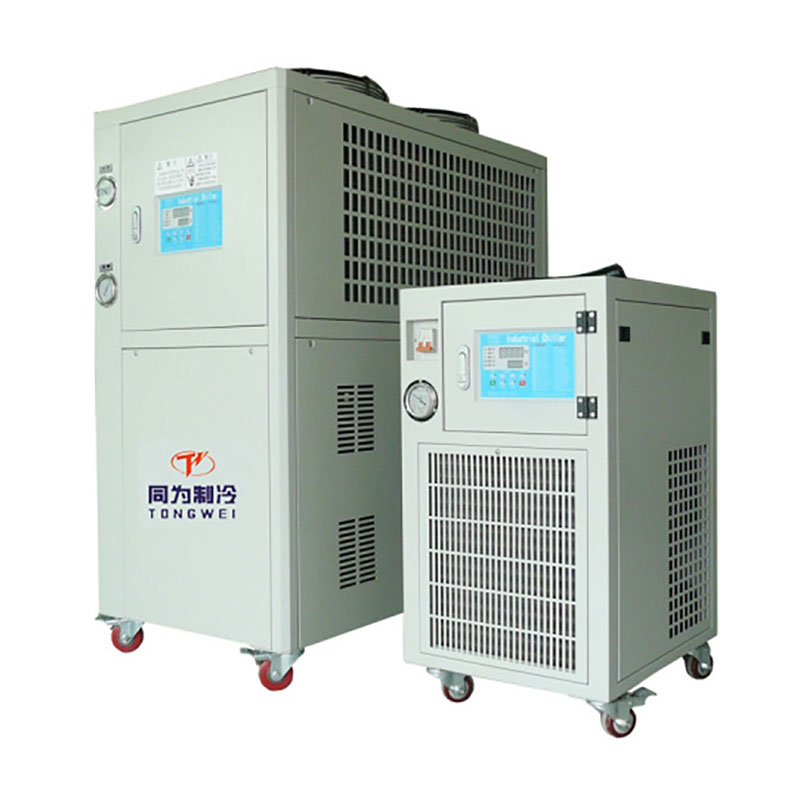Why Are Industrial Chillers Essential for Modern Manufacturing and Production?
2025-01-07
In the world of industrial manufacturing, temperature control plays a crucial role in ensuring that production processes run smoothly and efficiently. Whether it’s cooling machinery, maintaining product quality, or preventing overheating in sensitive equipment, industrial chillers are vital in keeping operations running without interruptions. But what exactly is an industrial chiller, and why are they so essential for modern manufacturing and production? Let’s explore the role of industrial chillers and why they’ve become indispensable in various industries.
What Is an Industrial Chiller?
An industrial chiller is a machine used to remove heat from a liquid through a refrigeration cycle. This process produces cool water or another type of coolant that can be used to regulate the temperature of various industrial systems, machinery, or processes. Industrial chillers are found in a wide range of industries, from food processing and pharmaceuticals to plastics manufacturing and HVAC (heating, ventilation, and air conditioning) systems.
There are two main types of industrial chillers: air-cooled and water-cooled. The difference lies in how the heat is dissipated. Air-cooled chillers use air to remove the heat from the refrigerant, while water-cooled chillers use water for heat exchange. Both types serve the same purpose but are suited to different operational environments and requirements.
Why Are Industrial Chillers So Important?
1. Ensuring Consistent Production Quality:
Many industrial processes require precise temperature control to ensure product quality. For example, in the food and beverage industry, temperature regulation is essential during production, packaging, and storage to prevent spoilage and maintain freshness. In manufacturing processes such as injection molding or die-casting, consistent cooling helps to maintain the structural integrity of the products. Industrial chillers help maintain these critical temperatures, ensuring that the final product meets quality standards.
2. Preventing Overheating of Equipment:
Machines and equipment that operate at high speeds or with heavy loads generate a significant amount of heat. Without proper cooling, this excess heat can lead to equipment malfunctions, reduced efficiency, or even total failure. Industrial chillers help to regulate the temperature of equipment, ensuring that it stays within safe operational limits. By doing so, they prevent costly downtime, reduce maintenance needs, and extend the lifespan of expensive machinery.
3. Enhancing Energy Efficiency:
Industrial chillers are designed to provide precise cooling with minimal energy consumption. Modern chillers are equipped with advanced technologies such as variable speed drives and energy-efficient compressors that help reduce overall energy use. By efficiently managing the cooling process, these chillers contribute to a more sustainable and cost-effective operation, which is especially important for industries with high energy demands.
4. Improving Process Efficiency:
In many industries, temperature control is not just about comfort or safety—it’s about optimizing the efficiency of a process. For instance, in chemical production, the speed and quality of reactions can be significantly affected by temperature. Industrial chillers help to control and maintain the optimal temperatures needed for chemical processes, thus improving both speed and yield. The ability to maintain consistent cooling can significantly enhance overall production efficiency and reduce the chances of production errors.
5. Supporting Industrial Flexibility:
In some industries, production lines or processes require a wide range of temperature settings to suit different products or stages in manufacturing. Industrial chillers are versatile and can be adjusted to meet varying cooling requirements. Whether a factory is running a high-temperature process or requires lower temperatures for specific steps, industrial chillers can be customized to deliver the right temperature for each operation.
6. Compliance with Regulatory Standards:
Many industries, especially those in food processing, pharmaceuticals, and chemicals, are subject to strict regulations regarding product quality and safety. Effective temperature control is often required to comply with these standards. Industrial chillers play an integral role in maintaining these regulated temperatures, ensuring that businesses adhere to health, safety, and quality guidelines. Failure to meet these standards can result in fines, product recalls, or damage to a brand’s reputation.
Key Applications of Industrial Chillers
1. Food and Beverage Industry:
Industrial chillers are used extensively in the food and beverage industry for processes such as refrigeration, cooling of ingredients, or controlling temperatures in fermentation and brewing. They ensure that products remain fresh, safe for consumption, and compliant with food safety regulations.
2. Chemical and Pharmaceutical Manufacturing:
In the chemical and pharmaceutical industries, precise temperature control is essential to maintain the integrity of products and reactions. Industrial chillers are used in reaction vessels, distillation columns, and other processing equipment to ensure that these processes run safely and efficiently.
3. Plastics and Injection Molding:
During injection molding, controlling the temperature of the molds is critical for achieving consistent product quality and maintaining the efficiency of the molding process. Industrial chillers provide the necessary cooling power to cool the molds quickly and evenly, ensuring high-quality plastic parts with minimal defects.
4. HVAC Systems:
Industrial chillers are widely used in large HVAC systems for commercial and industrial buildings, including hospitals, office complexes, and shopping centers. These chillers help regulate the temperature within buildings by cooling air or water used in heating and air conditioning systems.
5. Data Centers and Electronics Cooling:
Data centers require precise temperature control to ensure that servers and other equipment remain operational. Industrial chillers help to cool the air and equipment, preventing overheating and system failures in these high-tech environments.
How Do You Choose the Right Industrial Chiller?
Choosing the right industrial chiller depends on various factors, including:
- Cooling Capacity: Determine the amount of cooling required for the specific process or application. This is usually measured in tons of refrigeration (TR).
- Energy Efficiency: Look for energy-efficient models that minimize operating costs. Consider features like variable speed drives and heat recovery options.
- Type of Fluid: Some chillers use water, while others use glycol or other coolants. The choice of coolant depends on the specific application and environmental conditions.
- Installation and Maintenance Needs: Ensure that the chiller can be easily integrated into your existing system and that it comes with comprehensive maintenance support.
Conclusion: A Key Element in Modern Industrial Operations
Industrial chillers are more than just cooling machines—they are essential tools that contribute to quality control, efficiency, energy savings, and the longevity of manufacturing operations. As industries continue to grow and demand higher levels of precision and productivity, the role of industrial chillers will only become more critical.
From preventing equipment damage to ensuring compliance with industry regulations, industrial chillers are indispensable in a wide variety of sectors. Investing in the right chiller can enhance your business operations, reduce costs, and provide a more sustainable way to manage production needs. So, if you're in manufacturing or any process-oriented industry, it’s clear that industrial chillers are not just an option—they are a necessity.



